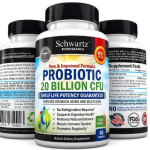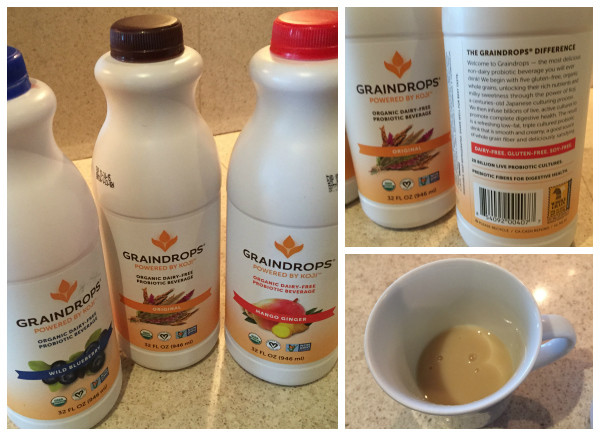Like many “healthy things” these days, there is controversy on the value of probiotics. I was offered the opportunity to try some probiotic supplements from Schwartz Bioresearch and a new gluten and dairy free probiotic beverage called Graindrops. I have heard that probiotics are good for you and since I (mostly) don’t eat dairy I was excited for the opportunity to try these non-dairy options.

What are probiotics anyway? Probiotic foods and beverages are those that are rich in live and active cultures. These foods help you digest and increase bio-availiability of nutrients in foods otherwise difficult for the body to digest. Prebiotic foods are non-living but encourage the growth of beneficial cultures inside you. Think of prebiotics as food for probiotics.
Probiotics are reported to:
- Promote the production of vitamins and the relief from allergies, gas, bloating and constipation.
- Increase the absorption of calcium for better bone density.
- Reduce digestive problems related to IBS or lactose intolerance.
- Fight bacteria in the gut and boost your immune system.
Since I read these things on the internet, I decided to check with the experts.
I asked Dr. Lisa who is “a skeptic.” [Lisa is my college and post college roommate and one of my BFFs who also happens to be an Infectious Disease doctor who worked on the design of a study with probiotics at one time. So she really is an expert.] She said:
“Probiotics are live bacteria that are found in yogurt , fermented dairy products or as supplements. They theory is that by ingesting probiotics we can repopulate our gut with “normal, healthy” bacteria and keep out immune system healthy. It turns out that over 90% of the DNA in our body actually belongs to bacteria!! Bacteria live on every part of our body ( teeth, skin, and lots of inside parts too.) Bacteria play an integral role in digesiton and stimulating our immune system. So when our bacteria has been depeleted (for instance when you take an antibiotic and wipe out all your normal gut bacteria), taking a probiotic can help repopulate your gut bacteria.”
From the Mayo Clinic: Do I need to include probiotics and prebiotics in my diet?
Answers from Katherine Zeratsky, R.D., L.D.
You don’t necessarily need probiotics — a type of “good” bacteria — to be healthy. However, these microorganisms may help with digestion and offer protection from harmful bacteria, just as the existing “good” bacteria in your body already do.
Prebiotics are nondigestible carbohydrates that act as food for probiotics. When probiotics and prebiotics are combined, they form a synbiotic. Fermented dairy products, such as yogurt and kefir, are considered synbiotic because they contain live bacteria and the fuel they need to thrive.
Probiotics are found in foods such as yogurt, while prebiotics are found in whole grains, bananas, onions, garlic, honey and artichokes. In addition, probiotics and prebiotics are added to some foods and available as dietary supplements.
Although more research is needed, there’s encouraging evidence that probiotics may help:
- Treat diarrhea, especially following treatment with certain antibiotics
- Prevent and treat vaginal yeast infections and urinary tract infections
- Treat irritable bowel syndrome
- Speed treatment of certain intestinal infections
- Prevent or reduce the severity of colds and flu
Side effects are rare, and most healthy adults can safely add foods that contain prebiotics and probiotics to their diets. If you’re considering taking supplements, check with your doctor to be sure that they’re right for you.
This research convinced me that the two products are worth a try.
Superior Probiotic Supplement 20 Billion CFUs – these supplements are in a capsule format and are recommended to be taken twice a day- one in the morning and one in the evening.
 Each batch of Schwartz Bioresearch’s probiotics are analyzed by professionals for purity and potency. The ingredients are 100% natural with no binders or fillers. The capsules are vegetarian, Non-GMO, contain no lactose, no soy, no iron, no gluten, no wheat, no chemicals or preservatives, no sugar, no artificial colors, flavors or sweeteners. They are manufactured in the USA, in an FDA-approved facility under strict GMP guidelines.
Each batch of Schwartz Bioresearch’s probiotics are analyzed by professionals for purity and potency. The ingredients are 100% natural with no binders or fillers. The capsules are vegetarian, Non-GMO, contain no lactose, no soy, no iron, no gluten, no wheat, no chemicals or preservatives, no sugar, no artificial colors, flavors or sweeteners. They are manufactured in the USA, in an FDA-approved facility under strict GMP guidelines.
I am not sure if these “worked” for me. I certainly had no adverse effects. My travels of late have set my stomach in a bit of turmoil and for the most part this leveled off. So I will keep up taking these and try to assess a before and after. There are a bunch of 5 star reviews on Amazon. They also have several specials available to save on these probiotics and other supplements from Schwartz Bioresearch. Check them out HERE.
 I saw Graindrops a while ago on Twitter and I have been keeping an eye out for them. I was offered the opportunity to try it and to tell you about it. Based in Northern California, Graindrops is dedicated to “promoting optimal health through wholesome nutrition, powered by nature.” Using batch crafted koji (the artisanal Japanese culturing of rice), Graindrops’ probiotic beverage is made from the purest ingredients to promote digestive health and “deliver extraordinary nutritional value.” All ingredients are organic, gluten free, dairy free, vegan, whole grain, and non-GMO.
I saw Graindrops a while ago on Twitter and I have been keeping an eye out for them. I was offered the opportunity to try it and to tell you about it. Based in Northern California, Graindrops is dedicated to “promoting optimal health through wholesome nutrition, powered by nature.” Using batch crafted koji (the artisanal Japanese culturing of rice), Graindrops’ probiotic beverage is made from the purest ingredients to promote digestive health and “deliver extraordinary nutritional value.” All ingredients are organic, gluten free, dairy free, vegan, whole grain, and non-GMO.
The creators of Graindrops focused on nutrition, taste and quality. With allergies and food sensitivities in mind, they decided on a gluten-free, grain-based beverage. They knew fermentation was the key to unlocking nutrients that would support digestive health and strengthen the immune system.

Graindrops comes in three flavors: Original, Mango Ginger Wild Blueberry. It is now available at Whole Foods Markets nationwide. I tried Wild Blueberry first. It is tangy like yogurt and is very smooth. They suggest in the FAQs that the taste is umami – sweet and sour. I am not sure if I agree, but I liked it! Next, I tried the Original. It has a grainy taste and a pleasant after taste. I can imagine mixing this with fruit or granola or putting it in a smoothie. The real winner for me is the Mango Ginger. The ginger and mango is the perfect mix of sweet and sour and a nice gingery zip/after taste. Each bottle is 32 oz (4 servings) and is reasonably priced at $5.69/bottle here in Chicago at Whole Foods. Compared to some of the kefir, juices and organic products, Graindrops is a steal. I can see keeping this on hand and adding a serving to my breakfast several days a week.
The winners are Laura R. and Annette! I have two coupons for one 32 oz bottle each. You must live near a Whole Foods that carries it to redeem it. Sounds good? Leave a comment on this post and let me know which flavor sounds best to you and if you have tried probiotics in your diet. Get an extra entry for liking Graindrops on Facebook or following on Twitter. Leave a separate comment telling me that you did. I will select 2 winners at random using random.org in order of comment on Thursday, March 19th. The winner must be a US resident (or have a US postal intermediary), must be 18 years of age or older and the offer is void where prohibited.
What do you think? Probiotics a “Do”? Leave your thoughts in the comments.
Please note: I was provided samples of both products at no cost in exchange for an honest review. I was not otherwise compensated for this post. All opinions are my own.
PS. Don’t miss my other great giveaways!



